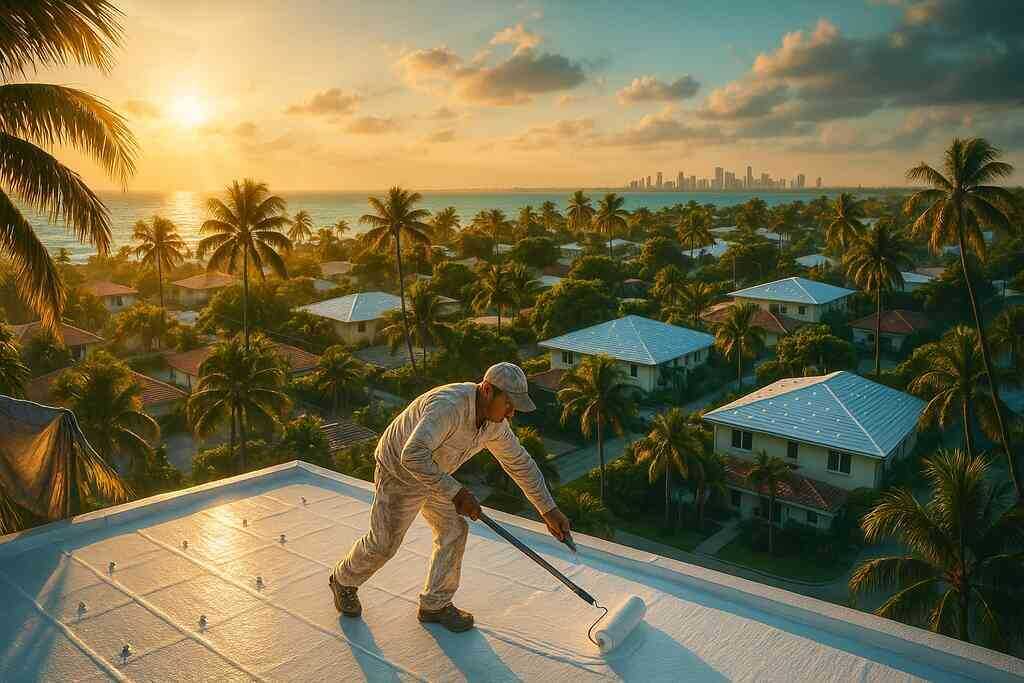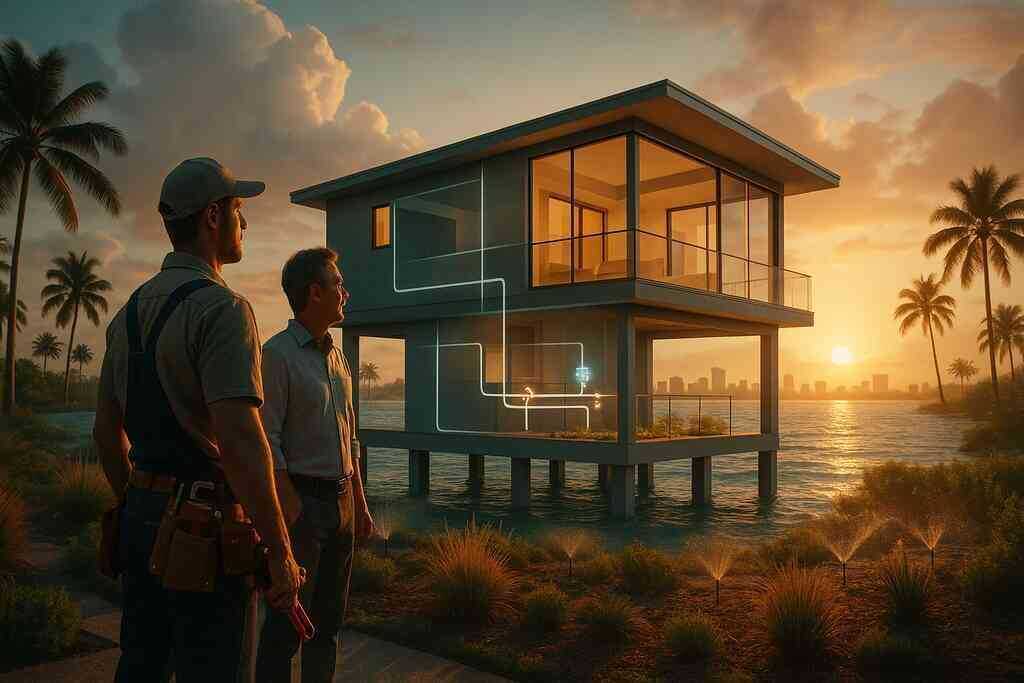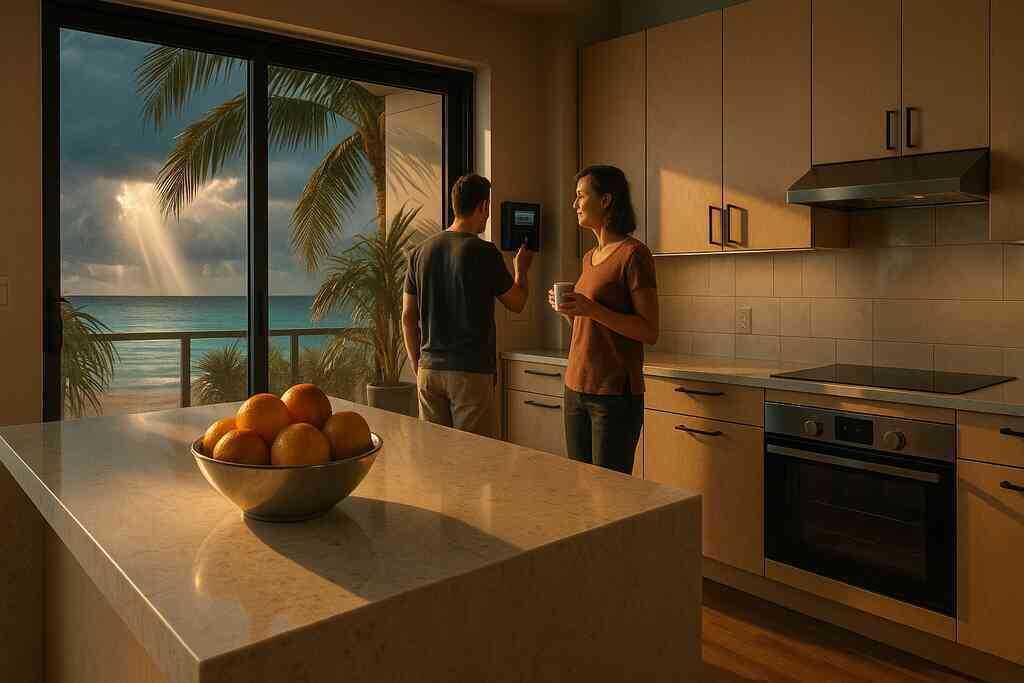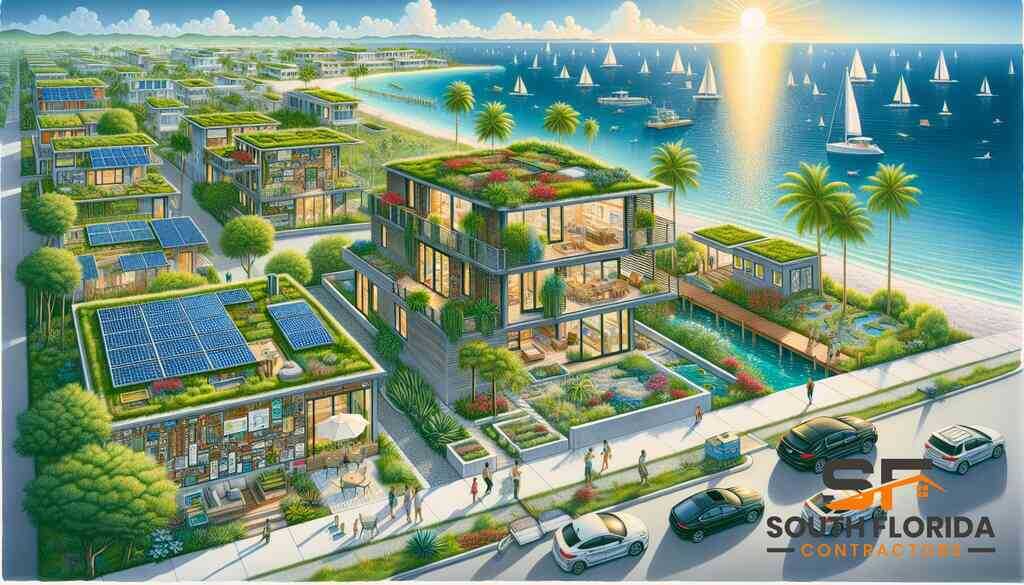
The Ultimate Guide to Sustainable Projects by South Florida Contractors
August 22, 2025
Foundation of Green Building Mastery
Understanding Sustainable Construction Methods
The core of any sustainable construction project lies in understanding effective methods. Sustainable construction strategies are designed to reduce environmental impact, cut costs, and promote energy efficiency. Key techniques include designing for durability, making use of local materials, and implementing waste minimization processes. In South Florida, general contractors employ locally sourced, sustainable materials to take advantage of the available natural resources and reduce carbon footprints in construction. Utilizing renewable energy sources like solar power and geothermal heating further enhances sustainability, creating homes prepared for future energy demands. Find eco-friendly contractors near South Florida to start your project with a focus on sustainability.
The Role of Eco-Friendly Architecture
Incorporating eco-friendly architecture into South Florida builds offers not only environmental benefits but also long-term financial savings. This approach emphasizes minimal disruption to the local ecosystem and maximizes the use of energy-efficient technologies. Features such as green roofs, high-performance building envelopes, and strategic window placement to optimize natural light play crucial roles. Biophilic design concepts are gaining momentum, enhancing indoor comfort and connectivity with nature. Architects and builders strive to integrate these principles to create spaces that promote well-being while being mindful of their environmental footprint. Through conscientious design choices, South Florida is leading the trend toward environmentally conscious projects near Miami.
Energy-Efficient Building Materials
Energy efficiency can significantly reduce a structure’s environmental impact, making the choice of building materials critically important. Modern construction in South Florida increasingly prioritizes sustainable building materials in Florida, like bamboo, reclaimed wood, and recycled metal. These materials excel in terms of both durability and reduced carbon emissions. Innovative insulation and glazing techniques aid in maintaining thermal efficiency, reducing the need for artificial heating and cooling. By using energy-efficient solutions, such as those seen in Boca Raton, homeowners can drastically cut down on operational costs over the lifetime of a property. Choosing sustainable construction materials is a vital step toward achieving the ultimate goal of net zero energy buildings.
Harnessing Renewable Power for the Future
Solar Energy Integration in South Florida Homes
In the sunny climate of South Florida, solar energy integration presents an unparalleled opportunity for maximizing energy efficiency. Beyond reducing electricity costs, solar panels contribute significantly to homes achieving net zero energy status. South Florida contractors are adept at designing and installing solar systems tailored to fit the unique architectural profiles of local residences. These systems seamlessly blend with the ethos of sustainable construction strategies, harnessing the plentiful sunlight to power homes sustainably. With a commitment to green innovation, integrating solar energy is becoming a standard practice, with sustainable construction evolution in Miami providing insights into emerging solar technologies.
Water Conservation Tactics in Construction
Water conservation is pivotal in creating sustainable buildings, with South Florida contractors adopting advanced techniques to ensure efficient water use. Implementing rainwater harvesting systems, low-flow plumbing, and xeriscaping are among the tactics employed to minimize water waste. These methods not only protect valuable water resources but also promote cost savings in utility bills. By honing in on precise water management techniques, contractors in South Florida are embedding sustainability at the core of their construction ethos, enhancing both functionality and environmental stewardship. This approach aligns with the principles of environmentally friendly urban design that prioritize the region’s ecological well-being.
Net Zero Energy Buildings: The New Norm
Net zero energy buildings are increasingly becoming the standard rather than the exception in South Florida’s architectural landscape. Such constructions achieve a balance between the energy they consume and the renewable energy they produce, vastly lowering carbon emissions. The design of these buildings involves meticulous planning centered on energy-efficient architecture principles. The integration of cutting-edge technologies and sustainable building materials ensures the realization of high-performance, eco-friendly structures. The transition to net zero is indicative of the broader shift towards energy-efficient home dynamics, setting a precedent for future advancements in green building. These projects exemplify the forward-thinking aspirations of South Florida’s construction industry, adeptly prepared to lead the charge towards a sustainable building future.
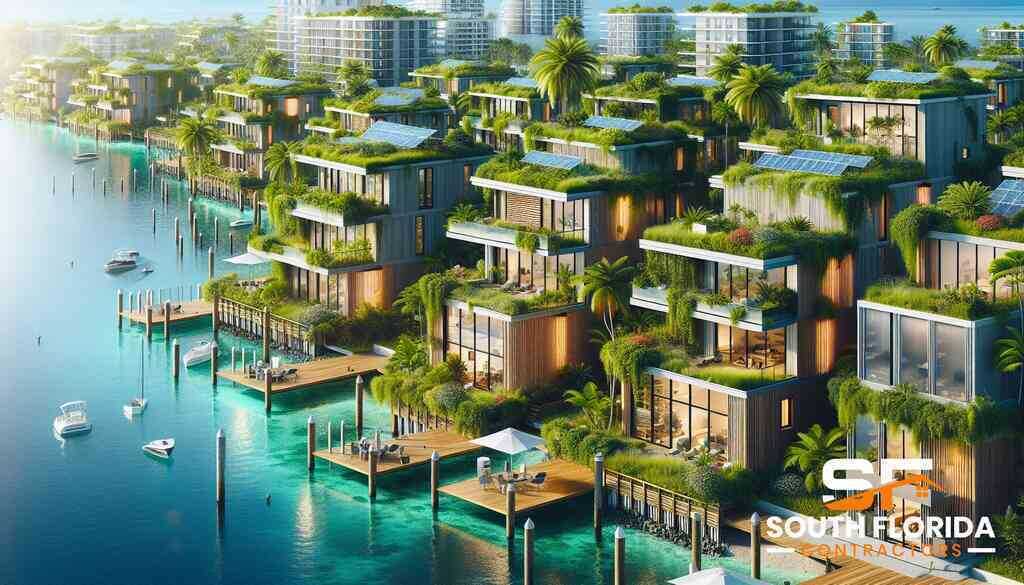
Revolutionizing Urban Landscapes
Climate-Resilient Constructions for Coastal Areas
In South Florida, where coastal areas are especially vulnerable to climatic change, the importance of climate-resilient constructions cannot be overstated. These projects are designed to withstand extreme weather conditions, such as hurricanes and rising sea levels. By integrating advanced structural techniques and materials that minimize environmental impact, contractors ensure the safety and durability of buildings. Utilizing sustainable construction strategies is essential not only to protect properties but also to conserve the natural beauty of the coastlines. It’s a proactive approach that safeguards investments and contributes to a stable, sustainable living environment.
Sustainable Urban Planning and Design
Sustainable urban planning is redefining the way cities like Miami develop and grow. By prioritizing sustainable urban planning insights, urban designers strategically create harmony between the built environment and the natural landscape. Employing techniques such as mixed-use developments, green spaces, and efficient public transportation systems, these strategies minimize the infrastructure’s carbon footprint. Environmental planners work hand-in-hand with local governments and stakeholders to ensure that growth is controlled and beneficial to the entire community, enhancing the quality of urban living while preserving resources for future generations. This collaborative effort leads to urban spaces that are not only livable but vibrant and resilient.
Environmentally Conscious Design for Urban Spaces
Designing urban spaces with environmental consciousness is gaining momentum in South Florida, driven by a need to combat urban heat islands and foster sustainable development. By focusing on the eco-design impact in South Florida, architects and city planners are implementing green roofs, reflective materials, and permeable surfaces to mitigate heat retention. These initiatives not only cool down surrounding areas but also support biodiversity by providing habitats for native plant species. Through conscious urban design, cities can become catalysts for positive environmental change, demonstrating a commitment to sustainable practices that benefit both the planet and its inhabitants.
Building Efficiently with Advanced Techniques
Modular Construction Techniques Unveiled
Modular construction techniques are revolutionizing how homes are built by emphasizing efficiency and sustainability. In South Florida, modular designs are becoming increasingly popular due to their ability to reduce construction time and minimize waste. This approach involves constructing separate sections or modules off-site, which are then transported and assembled at the final location. The precision of factory-built modules ensures high quality and uniformity, reducing the likelihood of defects. Moreover, modular construction allows for innovative design flexibility, catering to diverse aesthetic preferences and functional demands. This method not only provides cost savings but also supports sustainable construction projects in Delray Beach by reducing environmental impact.
Prefabricated Sustainable Homes: Fast and Green
Prefabricated sustainable homes are at the forefront of green construction, offering both speed and environmental benefits. These homes are designed and manufactured off-site, using sustainable materials and building practices that are optimized for eco-efficiency. Prefabricated structures can be erected significantly faster than traditional builds, minimizing disruption to the site and surrounding areas. Homeowners in South Florida are increasingly turning to these solutions due to their reliable quality and eco-friendly attributes. Prefabricated home design ensures that each component meets stringent sustainability standards, contributing to a reduced carbon footprint and energy-efficient living spaces. This trend is part of a larger move towards eco-friendly building solutions that prioritize rapid and responsible construction.
Passive Solar Building Design in Practice
Passive solar building design is an essential component of energy-efficient architecture, harnessing natural solar energy to regulate indoor climates. In South Florida’s sunny environment, this approach is particularly effective in reducing reliance on artificial heating and cooling systems. By strategically placing windows, selecting materials with suitable thermal mass, and optimizing building orientation, these designs effectively capture and retain solar energy. South Florida contractors adeptly integrate passive solar techniques into their projects, ensuring reduced energy consumption and enhanced indoor comfort. The adoption of passive solar design not only aligns with sustainable construction strategies but also demonstrates a commitment to leveraging the region’s natural advantages. This practice signifies a shift towards a future where homes are self-sustaining and harmonious with the environment.
Redefining Materials and Resources
Sustainable Materials Sourcing
Effective sustainable materials sourcing forms the backbone of eco-friendly construction efforts in South Florida. Contractors prioritize procuring materials locally to reduce transportation emissions and support regional economies. Sustainable materials, such as FSC-certified wood and rapidly renewable resources like bamboo, play pivotal roles in minimizing environmental footprints. Moreover, selecting suppliers committed to sustainable practices and ethical labor standards ensures a holistic approach to green building. In line with the region’s focus on sustainable construction strategies, South Florida contractors enhance resource efficiency while delivering cutting-edge, environmentally thoughtful projects. Employing advanced materials management further aids in reducing waste and improving lifecycle sustainability.
The Circular Economy in Construction
The circular economy presents a transformative approach to how resources are used in the construction industry, driving a shift from wasteful linear models to sustainable cycles. By emphasizing reuse, refurbishment, and recycling, South Florida’s circular economy in construction model minimizes waste and conserves valuable resources. As part of these efforts, contractors are innovating to recover materials from deconstructed buildings, fostering new life through repurposing. This not only diminishes the strain on raw materials but also encourages innovative construction practices in Boca Raton. The adoption of circular principles supports economic and environmental sustainability, offering robust frameworks for future urban development across the state.
Recycled Construction Materials for a Lower Carbon Footprint
Incorporating recycled construction materials is crucial for reducing the carbon footprint of construction projects. South Florida contractors are at the forefront, utilizing materials like reclaimed wood, recycled metal, and crushed concrete in new builds. These elements not only conserve resources but also enhance the sustainability profile of the projects. Recycled materials are seamlessly integrated into residential and commercial builds, supporting the push toward net zero energy buildings. Through collaboration with manufacturers specializing in sustainable building materials in Florida, contractors ensure access to high-quality, eco-friendly components. This commitment reflects a broader shift towards using recycled inputs, essential for sustainable site development and inspiring a construction industry-wide transformation.
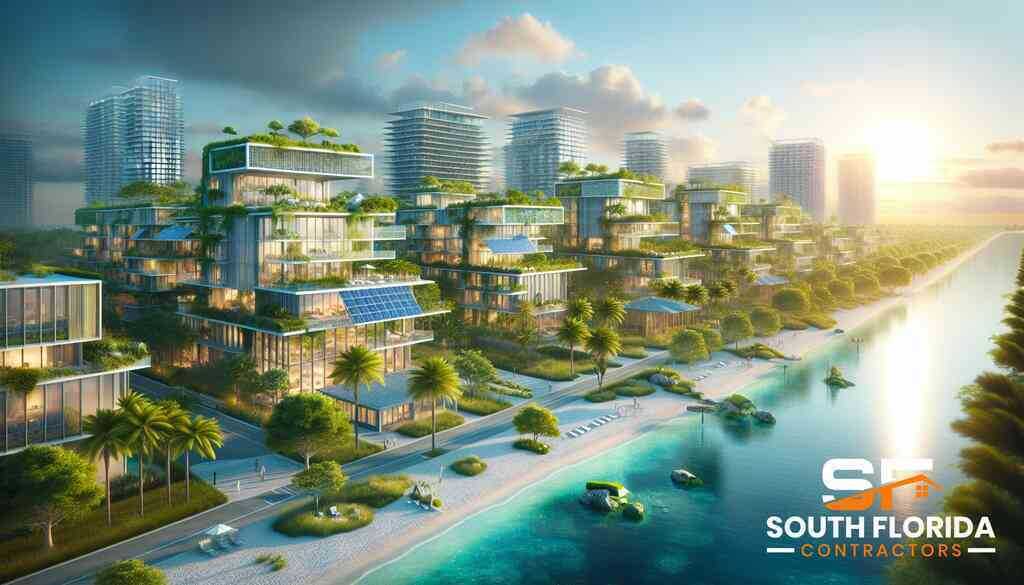
Crafting a Sustainable Future: The Path Ahead
Green Retrofitting Existing Structures
Green retrofitting involves modifying existing buildings to enhance their sustainability and energy efficiency. As an effective way of reducing energy consumption and extending the life of a structure, it plays a significant role in revitalizing older buildings in South Florida. Retrofit projects can include installing energy-efficient windows, upgrading insulation, or adding solar panels. This process not only cuts down utility costs but also elevates the value of the property. The movement towards green retrofitting showcases an essential trend in accommodating modern eco-friendly builds in Levy County. By prioritizing these upgrades, property owners contribute to a renewable construction resources initiative, making meaningful strides towards a sustainable future.
The Impact of Low-Impact Construction Techniques
Embracing low-impact construction techniques is crucial in minimizing the environmental disturbances caused by building activities. In South Florida, contractors focus on methods that limit site disruption, conserve resources, and manage waste. Techniques such as selective deconstruction, soil erosion control, and the use of recycled materials contribute significantly to sustainability goals. By adhering to these practices, builders can lessen the carbon footprint of construction projects and support the transition to zero waste principles. This approach aligns seamlessly with the broader objective of achieving net zero energy buildings. With contractors implementing these innovative construction practices in Boca Raton, South Florida continues to lead in eco-friendly urban development.
Enriching Designs with Biophilic Concepts
Biophilic design is transforming how urban spaces are conceived, promoting a deep connection with nature through thoughtful architectural elements. By incorporating natural light, vegetation, and organic forms, these designs enhance both well-being and environmental stewardship. Architects in South Florida are adeptly integrating these principles to create harmonious spaces that foster health and relaxation. Buildings featuring biophilic elements are not only aesthetically pleasing but also offer psychological and physiological benefits to occupants. This trend towards harmonious living environments demonstrates a commitment to enriching urban landscapes while maintaining an environmentally conscious ethos. Consequently, biophilic concepts, part of the eco-design impact in South Florida, are shaping the next generation of sustainable architecture, marrying beauty with purpose.
Frequently Asked Questions
Question: What sustainable construction methods are used by general contractors in South Florida, according to The Ultimate Guide to Sustainable Projects by South Florida Contractors?
Answer: South Florida Contractors utilize a variety of sustainable construction methods aimed at reducing environmental impact and promoting energy efficiency. These methods include designing for durability, employing locally sourced sustainable materials, and implementing waste minimization processes. Furthermore, they incorporate renewable resources such as solar energy and geothermal heating to enhance the energy efficiency of homes. These practices not only reduce the carbon footprint of each project but also ensure that structures are prepared to meet future energy demands. Choosing South Florida Contractors guarantees that your construction projects embrace these eco-friendly and sustainable methodologies.
Question: How do South Florida Contractors integrate eco-friendly architecture into their projects?
Answer: Eco-friendly architecture is a cornerstone of the projects undertaken by South Florida Contractors. This approach minimizes ecological disruption and harnesses energy-efficient technologies to offer long-term financial savings. Key features include green roofs, high-performance building envelopes, and strategic window placements to optimize natural lighting. By implementing these elements, our contractors ensure projects blend seamlessly into the natural environment, prioritize biophilic design principles, and offer enhanced indoor comfort. Clients can trust South Florida Contractors to incorporate these sustainable architecture strategies into every build.
Question: Can South Florida Contractors help achieve net zero energy buildings and if so, how?
Answer: Absolutely. South Florida Contractors possess the expertise necessary to create net zero energy buildings that strike a balance between energy consumption and production. Through meticulous planning, they integrate cutting-edge technologies, energy-efficient architecture principles, and sustainable building materials. Our contractors are skilled in using solar energy integration and other renewable resources, ensuring that your building generates enough energy to meet its operational needs. This not only reduces carbon emissions but also aligns with sustainable urban planning and net zero energy building norms. By choosing South Florida Contractors, clients can be at the forefront of this sustainable building trend.
Question: What role does water conservation play in the sustainable projects by South Florida Contractors?
Answer: Water conservation is pivotal in the sustainable projects executed by South Florida Contractors. By employing techniques such as rainwater harvesting, xeriscaping, and using low-flow plumbing systems, they ensure efficient water usage and minimize waste. These strategies not only help conserve valuable water resources but also reduce utility costs for homeowners. Enhanced water management techniques are embedded in their projects, reflecting a commitment to environmental stewardship and functionality. Clients can rely on South Florida Contractors for sustainable practices that safeguard natural resources, promoting a balanced ecological impact.
Question: How do recycled construction materials contribute to reducing the carbon footprint in projects handled by South Florida Contractors?
Answer: Recycled construction materials play a critical role in reducing the carbon footprint of projects managed by South Florida Contractors. By integrating materials such as reclaimed wood, recycled metal, and crushed concrete, they not only conserve natural resources but also elevate the sustainability profile of each build. These materials are chosen for both residential and commercial projects to support the vision of net zero energy buildings. Collaborating with manufacturers dedicated to sustainable building materials in Florida, South Florida Contractors ensure access to high-quality, eco-friendly resources. Their dedication to incorporating recycled construction materials marks a significant advance towards sustainable site development and illustrates a broader commitment to circular economy principles within the construction industry.
